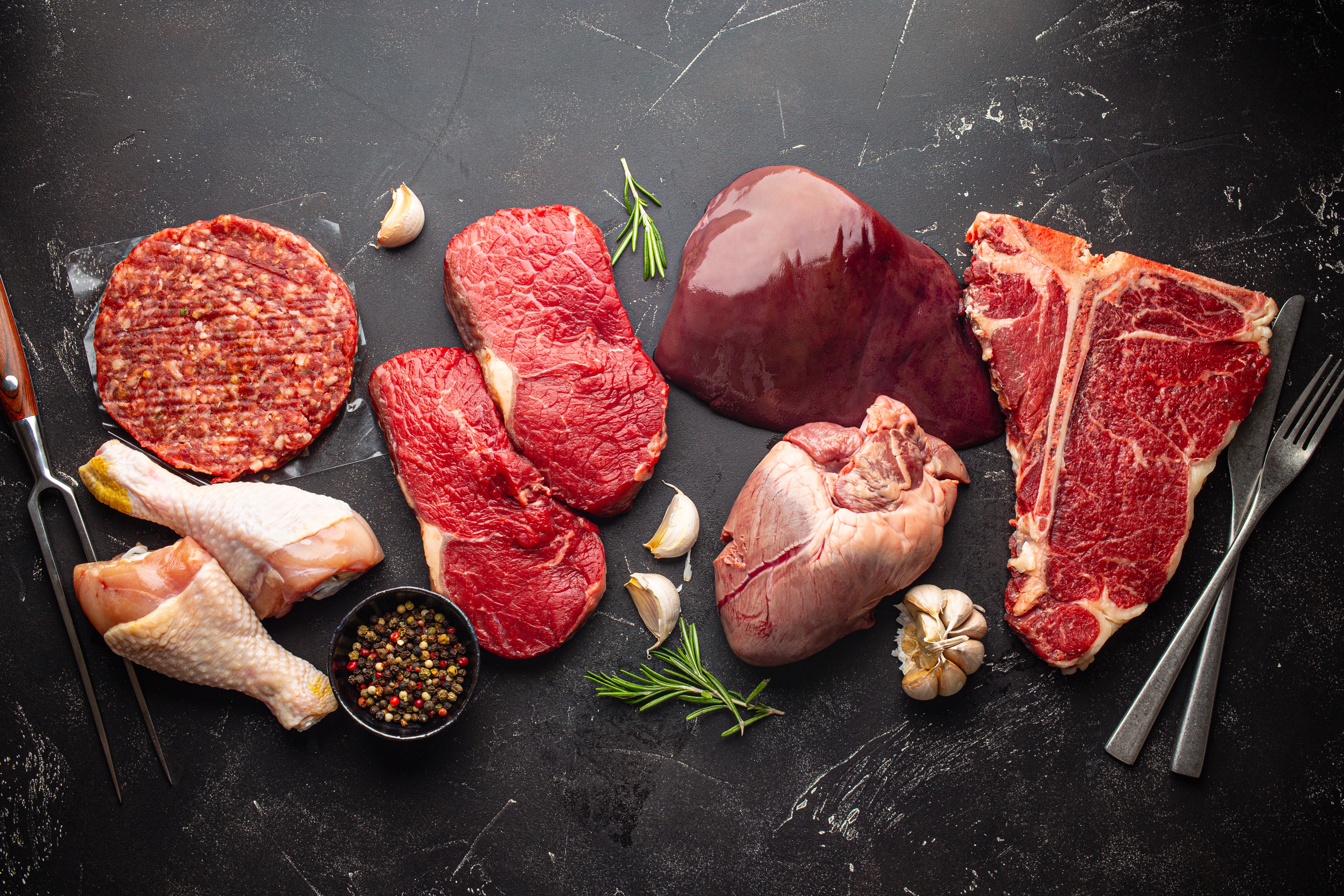The carnivore diet is a dietary approach that involves eating only animal products, such as meat, fish, eggs, and dairy. This diet has gained popularity in recent years, with proponents claiming that it can lead to weight loss, improved mental clarity, and reduced inflammation.
While the carnivore diet may seem extreme and restrictive, its supporters argue that it can be a healthy and sustainable way of eating. They believe that humans evolved to eat a diet high in animal products, and that our bodies are better suited to this type of diet than to the modern Western diet, which is high in processed foods and carbohydrates. However, critics of the diet argue that it is lacking in important nutrients, such as fiber and certain vitamins and minerals, and that it may increase the risk of health problems such as heart disease and cancer.
Contents
Understanding the Carnivore Diet
The carnivore diet is a dietary approach that emphasizes the consumption of animal-based foods while excluding all plant-based foods. This means that the diet consists almost exclusively of meat, fish, eggs, and low lactose dairy. A person following the diet may also use honey, salt, pepper, and other spices. The carnivore diet is also known as the zero-carb diet or animal-sourced foods (ASF) diet.
Proponents of the carnivore diet argue that it can lead to weight loss, improved digestion, and increased energy levels. They also claim that the diet can help reduce inflammation and improve overall health. However, there is limited scientific evidence to support these claims.
One of the main reasons people choose to follow the carnivore diet is to eliminate potentially harmful plant-based foods from their diet. Some people may have sensitivities or allergies to certain plant-based foods, which can cause digestive issues and other health problems. By eliminating these foods, they hope to improve their overall health and well-being.
It's important to note that the carnivore diet is a highly restrictive diet that eliminates entire food groups. This can make it difficult to get all of the necessary nutrients for optimal health. For example, plant-based foods are a rich source of fiber, vitamins, and minerals that are important for overall health. However, it is possible to obtain these nutrients from animal-based foods, such as organ meats and bone broth.
In conclusion, the carnivore diet is a highly restrictive dietary approach that emphasizes the consumption of animal-based foods while excluding all plant-based foods. While some people may experience benefits from following this diet, it's important to consider the potential risks and limitations. It's also important to consult with a healthcare professional before making any significant changes to your diet.
Origins of the Carnivore Diet
The carnivore diet is a dietary approach that involves consuming only animal products while excluding all other foods, including vegetables, fruits, grains, and legumes. While it may seem like a recent trend, the idea of an exclusive meat diet can be traced back to the mid-19th century.
In 1856, the German writer Bernard Moncriff published "The Philosophy of the Stomach: Or, An Exclusively Animal Diet," in which he described his year-long experiment of living on only beef and milk. Moncriff claimed that this diet improved his health and digestion, and he recommended it as a cure for various ailments.
In the 1870s, Italian physician Arnaldo Cantani prescribed an exclusive animal-based diet to his diabetic patients. Cantani believed that carbohydrates were responsible for the symptoms of diabetes and that an all-meat diet could help control blood sugar levels. He reported success in treating his patients with this diet.
Since then, the carnivore diet has gained popularity among some individuals who believe that it can improve their health and well-being. However, there is limited scientific evidence to support the benefits of this diet, and it may pose some risks and challenges.
Benefits of the Carnivore Diet

The carnivore diet is a diet that consists of consuming only animal products and excludes all other food groups, including fruits, vegetables, grains, and legumes. While the carnivore diet is controversial and not recommended for everyone, it does have some potential benefits.
Weight Loss
One of the most significant benefits of the carnivore diet is that it may promote weight loss. The carnivore diet eliminates high-carb, heavily processed ingredients, many of which are also high in calories. Decreasing your intake of these calorie-dense foods, such as chips, candy, crackers, and cookies, could potentially help promote weight loss. Additionally, protein is more satiating than carbohydrates, which means you may feel fuller for longer periods and consume fewer calories overall.
Improved Blood Sugar Levels
Another potential benefit of the carnivore diet is that it may help regulate blood sugar levels. The carnivore diet eliminates all carbohydrates, which means that it is a low-carbohydrate diet. Low-carbohydrate diets have been shown to improve insulin sensitivity and blood sugar control in people with type 2 diabetes. However, it is important to note that the carnivore diet is not recommended for people with diabetes without first consulting with their healthcare provider.
Mental Clarity
Some people who follow the carnivore diet report experiencing mental clarity and improved focus. The theory behind this is that the carnivore diet eliminates all potential food allergens and irritants, which can cause inflammation in the body and brain fog. Additionally, the high intake of protein and fat may provide the brain with the necessary nutrients to function optimally.
In conclusion, the carnivore diet may have some potential benefits, including weight loss, improved blood sugar levels, and mental clarity. However, it is important to note that the carnivore diet is a highly restrictive diet and is not recommended for everyone. It is essential to speak with a healthcare provider before starting any new diet or making significant changes to your current diet.
Potential Risks of the Carnivore Diet
While the carnivore diet may offer some benefits, it is important to consider the potential risks associated with this way of eating. The following sub-sections outline some of the main concerns.
Nutrient Deficiencies
One of the biggest concerns with the carnivore diet is the potential for nutrient deficiencies. Since this diet eliminates many plant-based foods, it can be difficult to get enough fiber, vitamins, and minerals. For example, a lack of vitamin C can lead to scurvy, a condition characterized by weakness, fatigue, and bleeding gums. In addition, a lack of fiber can lead to constipation, while a lack of calcium can lead to osteoporosis.
Heart Health Concerns
Another potential risk of the carnivore diet is the impact it may have on heart health. Some studies have suggested that a diet high in red meat may increase the risk of heart disease and stroke. This is thought to be due to the high levels of saturated fat and cholesterol found in animal products. While some proponents of the carnivore diet argue that these concerns are unfounded, it is important to consider the potential risks associated with a diet that is high in animal products.
In conclusion, while the carnivore diet may offer some benefits, it is important to consider the potential risks associated with this way of eating. Nutrient deficiencies and heart health concerns are two of the main concerns that should be taken into consideration before embarking on this type of diet. It is always a good idea to speak with a healthcare professional before making any major changes to your diet.
How to Follow the Carnivore Diet

The carnivore diet is a type of diet that emphasizes the consumption of animal products and excludes plant-based foods. Here are the steps to follow the carnivore diet:
Food List
The carnivore diet is quite simple. If it was alive and contained protein and fat, then it probably passes the carnivore diet test. For the most part, this will be a food list of red meat and other meat products, but adding some dairy products is also allowed when you're on an all-meat diet. Here are some of the foods that you can eat on the carnivore diet:
- Beef (ground beef, steak, roast, etc.)
- Pork (bacon, pork chops, etc.)
- Poultry (chicken, turkey, etc.)
- Fish and seafood (salmon, shrimp, etc.)
- Eggs (chicken, duck, etc.)
- Dairy products (butter, cheese, cream, etc.)
You can also use honey, salt, pepper, and zero-carb seasonings. However, other foods such as fruits and vegetables, grains, high lactose dairy, sugars, and plant-based oils are not allowed.
Sample Meal Plan
Here's an example of a one-day meal plan for the carnivore diet:
- Breakfast: 3 eggs fried in butter with 3 slices of bacon
- Lunch: 8 oz. of grilled steak with a side of creamed spinach
- Dinner: 6 oz. of salmon with a side of broccoli and a pat of butter
You can also include bone broth as a snack or a side dish. It's important to note that the carnivore diet is not meant to be a long-term diet, and it's recommended to consult a healthcare professional before starting any new diet.
Scientific Research on the Carnivore Diet
The carnivore diet is a relatively new diet trend that has gained popularity in recent years. While there is limited scientific research on the carnivore diet, some studies have been conducted to investigate its effects on the human body.
One study published in the journal Nutrients found that a carnivorous diet can provide all essential nutrients, including vitamins, minerals, and amino acids. However, the study noted that long-term adherence to a carnivorous diet may increase the risk of nutrient deficiencies, particularly in regards to fiber and vitamin C.
Another study conducted by researchers at Harvard University surveyed individuals who followed a carnivorous diet for at least six months. The study found that the majority of respondents reported improvements in various health markers, including weight loss, reduced inflammation, and improved mental health. However, the study was limited by its reliance on self-reported data and the small sample size.
A review of the available research on the carnivore diet published in the Journal of the International Society of Sports Nutrition concluded that while the diet may be effective for short-term weight loss, there is insufficient evidence to support its long-term safety or efficacy.
Overall, while there is some evidence to suggest that a carnivorous diet may have potential health benefits, more research is needed to fully understand its effects on the human body. It is important to note that the carnivorous diet is a highly restrictive diet that eliminates entire food groups, and may not be suitable for everyone. Individuals considering the carnivorous diet should speak with a healthcare professional before making any significant changes to their diet.
Conclusion
In conclusion, the carnivore diet is a diet that consists primarily of animal-based foods such as meat, fish, eggs, and low lactose dairy. While some proponents of the diet claim that it can lead to weight loss, reduced inflammation, and increased testosterone levels, there is little scientific evidence to support these claims. Additionally, the diet comes with significant drawbacks, including the risk of nutrient deficiencies, constipation, and an increased risk of heart disease and other health problems.
It is important to note that the carnivore diet is not a balanced or sustainable way of eating. It eliminates many nutrient-rich foods, such as fruits, vegetables, and whole grains, that are essential for good health. While it may be tempting to try the carnivore diet as a quick fix for weight loss or other health concerns, it is not a long-term solution and can actually be harmful to your health in the long run.
If you are looking to improve your health and well-being, it is important to focus on a balanced and sustainable diet that includes a variety of nutrient-rich foods. This can include lean proteins, whole grains, fruits, vegetables, and healthy fats. By making small, sustainable changes to your diet and lifestyle, you can improve your health and well-being over time.
Frequently Asked Questions
What does the carnivore diet consist of?
The carnivore diet is an eating plan that consists of only animal-based foods. People who follow this diet consume meat, fish, poultry, eggs, and some dairy products. The diet eliminates all plant-based foods, including fruits, vegetables, grains, and legumes.
What are the negatives of the carnivore diet?
While the carnivore diet may help some people lose weight and improve certain health conditions, it is not without its drawbacks. One of the biggest negatives of the carnivore diet is that it eliminates all plant-based foods, which can lead to nutrient deficiencies. Additionally, consuming high amounts of red meat has been linked to an increased risk of heart disease and certain types of cancer.
What does your body do on the carnivore diet?
When you follow the carnivore diet, your body enters a state of ketosis, which means it is burning fat for fuel instead of carbohydrates. This can lead to weight loss and improved insulin sensitivity. However, it is important to note that long-term ketosis can be harmful to your health and may lead to nutrient deficiencies.
How long should I do the carnivore diet?
The length of time you should follow the carnivore diet depends on your individual goals and health needs. Some people follow the diet for a few weeks or months, while others follow it long-term. However, it is important to consult with a healthcare provider before starting the carnivore diet to ensure it is safe for you.
How long should you do the carnivore diet?
The length of time you should follow the carnivore diet depends on your individual goals and health needs. Some people follow the diet for a few weeks or months, while others follow it long-term. However, it is important to consult with a healthcare provider before starting the carnivore diet to ensure it is safe for you.
What do you eat on a carnivore diet?
On the carnivore diet, you eat only animal-based foods. This includes meat, fish, poultry, eggs, and some dairy products. It is important to choose high-quality, nutrient-dense animal products and to vary your protein sources to ensure you are getting all the necessary nutrients. Some people also include organ meats in their diet, as they are rich in vitamins and minerals.





